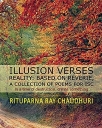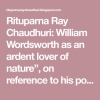
The Nightingale also embodies the age-old human experiences that however distressful the human condition is: Man still possesses the capacity to respond to immortal beauty and thus to establish communion with the unchanging world beyond flux and mutability. Thus in different ages men of different classes and social positions-“emperor and clown”, distressed women, captive princesses-had, in certain fleeting moments, glimpses of this unchanging world of beauty.
There are inspired moments when the present beauty of nature with all its sensuous appeal gives a fleeting vision of deeper reality. Indeed, the songs of spring do not stay; beauty does not keep her lustrous eyes for long. So beauty is transitory, fleeting -it remains for a time and passes away. It is the experience of the senses, but imagination revealed the essential truth about beauty.
The natural beauty of the world of Nightingale subdues mental strain to a large extent. The happy lot of the Nightingale also generates a death wish very clearly, “Now more than ever seems it rich to die”, but finally comes back into the world of reality with the sound of just one word, ‘Forlorn’, a word that reminds of the human lot; these strains have resulted from the intricate complexities of human life.
Some are suffering from palsy, the others are dying young. Everyone has one problem or the other so much so that “Men sit and hear each other groan.” In nutshell, man is suffering from so many that the world has become a place “Where but to think is to be full of Sorrow”.
In order to find relief from the heavy burden of human worries, the human wants to fly far away into the world of the Nightingale who, “Among the leaves hast never known” as to how miserable is the life of man in the world of reality. Nature takes the bird away from the weariness, the fever, and the fret of the present world to the eternity of beauty, represented by the song of the nightingale.
The focus is predominately on the ephemeral character of all that is valuable and desirable in life. Human sorrow and suffering and loss are mainly due to the decay and fickleness of youth, health, beauty, and love. The quickly perishable charms of life under the ruthless domination of devouring time only leaves an inevitable sense of inconsolable gloom and despair. The destructive process in the life of reality is also expedited by ‘hungry generations’ treading on the existing beings and things. He has the knack for capturing the most essential detail and compelling our attention. The earlier hankering for the world of Flora and Pan- for unreflecting enjoyment of sensuous delights- is past; the man now subjected himself persistently and unflinchingly to life. The man faced life with all uncertainties and contradictions, its sorrows and joys.
Melancholy arises from the transience of joy that is transient by its nature. Therefore, accepting life as a whole-with its joy and beauty as well as its pain and despair is this alternation of joy and pain, light and shadow. This gives life its harmony wholly in the time, imaginatively is the truth of life- and the truth is a beauty.... He lives wholly in the present, and does not look back to the past or forward into the future!
About the Author







Comments